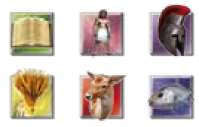

These symbols represent the six progress tracks on the city-state sheet. A squared symbol by itself indicates the player must advance his progress marker one space on the corresponding track.

This is a "wild" symbol, and it indicates the player must advance one of the production progress markers of his choice (agriculture, hunting, or fishing) one space.

These symbols represent the three types of resources: grain, meat, and fish.
When they are on the left side of a Building card, they represent the cost of that building (the number near the symbol is the quantity of that type of goods that must be paid).
When they are on the game board or inside the effect text of a Building card, these symbols indicate the player produces one of the three types of resources (grain, meat, or fish).
When they are on the city-state sheet, the symbols represent how many cubes of the resources the player receives when producing.

This amphora is a "wild" symbol that can represent any resource (grain, meat, or fish). When a player is paying a cost that includes  , he chooses which type of resource cube to spend. If he is receiving resources from the supply that include
, he chooses which type of resource cube to spend. If he is receiving resources from the supply that include  , he chooses the type of resource he receives.
, he chooses the type of resource he receives.
Note: If the cost of a building includes multiple  , the player paying the cost does not have to pay resources of all the same kind. For example, to build an "Agora", a player must spend two
, the player paying the cost does not have to pay resources of all the same kind. For example, to build an "Agora", a player must spend two  . He could use two identical resources, or two different ones, as he prefers.
. He could use two identical resources, or two different ones, as he prefers.

This is a "wild" symbol that indicates the player must produce any one type of resource of his choice (grain, meat, or fish.

This symbol represents one victory point.

This symbol represents war. It allows the player to declare a war against another player. The defender of the war is not declared until after all favors from the current deity have been received.

This symbol indicates the player must advance any one of his progress markers of his choice one space. He is still subject to the standard limitations to progress.

This symbol indicates the player must move any one of his progress markers backward one space. The owner of the progress marker chooses which track is affected.
Note: If the player's culture level drops below the value required to build a building he already owns, nothing happens to the building (since players check the culture level prerequisite only when they first build the building).
A progress marker on the first space of its track cannot be moved backward. If a building forces all players to move a progress marker, the player who owns the building is the first to move, and then the other players choose in clockwise order.

This symbol indicates the "Alpha" favor space of a deity, or the benefits a player receives when he places one of your priests there.

This symbol indicates the "Beta" favor space of a deity, or the benefits a player receives when he places one of his priests there.

This symbol represents the favor of Zeus.

This symbol represents the option to build a building.

This symbol represents the plague of Apollo.

This symbol represents protection from the plague of Apollo.
Continue Reading
